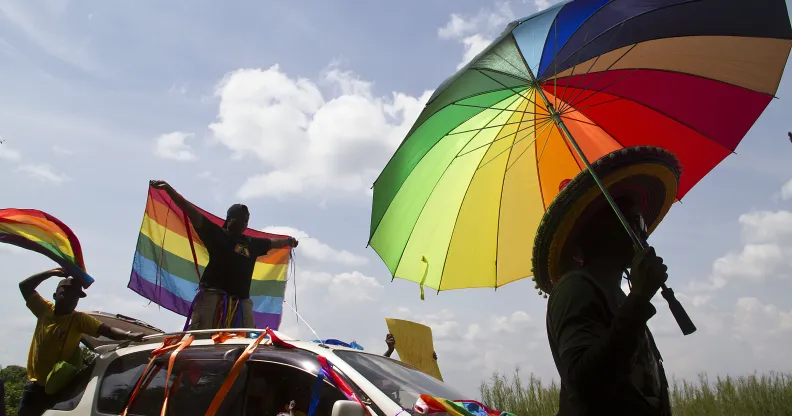Uganda passes reviled bill defining anal sex as an ‘unnatural offence’ while doubling down on gay sex ban

Uganda is one of around 70 countries where being gay is punishable by imprisonment. (ISAAC KASAMANI/AFP via Getty Images)
Uganda’s parliament has passed a bill that further outlaws same-sex relations, anal sex and sex work – doubling down on a penal code that already makes being LGBT+ illegal.
The parliament of Uganda confirmed Monday (3 May) on Twitter that the Sexual Offences Bill had passed its third reading, ending its years-long passage through the chamber.
Much of what the Sexual Offences Bill criminalises is already illegal in Uganda. Those caught engaging in same-sex relations already face life imprisonment, and some of the wording of the Sexual Offences Bill is ripped from the Penal Code Act 1950.
A 2000 amendment to the code meant that sex acts between women were also criminalised, with both oral and anal sex between same-sex and mixed-sex couples carrying a seven-year-long prison sentence for “gross indecency“.
First tabled in 2015, the Sexual Offences Bill was sold as a hardline effort to stamp out sexual violence by addressing “defects” in the penal code.
But in plugging the gaps of the penal code, the law also further criminalises being LGBT+ and mounts sweeping restrictions on the sexual lives of everyday Ugandans.
Under Clause 11, “unnatural offences” will include both bestiality and those who “perform a sexual act with another person contrary to the order of nature”.
The Committee of the Whole House, composed of all sitting MPs, also added in a “ban on sexual acts between persons of the same gender”, The Independent reported.
Lawmakers also passed the committee’s recommendations that, “for completeness”, to “penetrate another person’s anus with that person’s sexual organ or any object” be added to the list of “unnatural offences”.
The Parliament of Uganda yesterday passed the Sexual Offences Bill,2019
The unjust recommendations and clauses in the bill which criminalise same sex acts and sex work create avenues for further infringement on the rights of persons targeted under the guise of enforcing the law pic.twitter.com/i9nOJgzMnA
— hrapf (@hrapf_uganda) May 4, 2021
The wide-ranging law includes introducing a sex offenders registry and making it an offence to use date rape drugs or to release a tape or recording of a sex act without that person’s consent. Although, during committee scrutiny, a vital clause was scrapped that would have allowed the withdrawal of consent before or during sex acts.
Other new measures include tougher safeguarding measures to protect children from sexual harassment in schools.
Lawmakers also expanded a clause to not only consider sex work an offence but criminalises those who pay for sex as well.
The already existing criminalization in the penal code Act has already caused great damages to LGBTQ persons. This move by @Parliament_Ug to further criminalize consensual same sex intercourse is not only threat to bodily autonomy but as well to access to health. pic.twitter.com/R5X2sfblUd— LET'S WALK UGANDA (@LWUGANDA) May 4, 2021
As much as lawmakers were divided along gendered lines about some of the bill’s clauses, such as the withdrawal of consent, the House was in agreement about clauses that criminalise homosexuality.
In Uganda, the mood has long been one of rising fear and anger for LGBT+ residents.
After all, the bill comes more than a year after lawmakers did an abrupt about-turn on the so-called “Kill the Gays” bill that sought to introduce the death penalty for “aggravated homosexuality”.
This wasn’t the first time the greatly feared legislation came close to becoming a reality. It was first passed by parliament in 2014, only to be thwarted by the constitutional court amid seismic international backlash.

